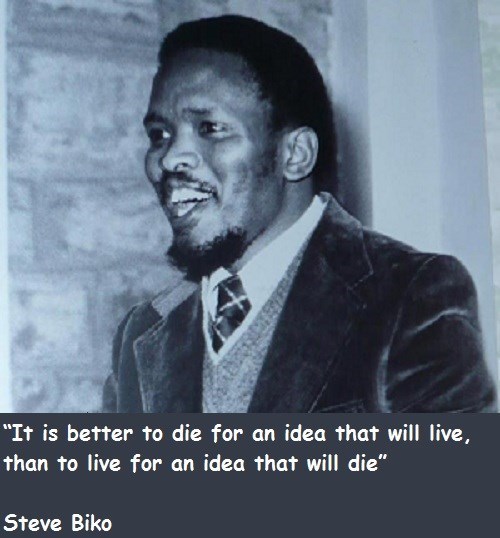 |
| (http://en.nkfu.com/steven-biko-quotes/ ()) |
"It is better to die for an idea that will live, than to live for an idea that will die" (Agentofchange). These are the words of a South African man by the name of Stephen Bantu Biko. Biko was a martyr who died for the liberation of black South Africans from a white-minority government. "One of the greatest legacies of the struggle that Biko waged - and for which he died - was the explosion of pride among the victims of apartheid. The value that black consciousness placed on culture reverberated across our land; in our prisons; and amongst the communities in exile. Our people, who were once enjoined to look to Europe and America for creative sustenance, turned their eyes to Africa"(Steven). Steve Biko gave up finishing his education, time with his family, and having a more peaceful life for the better cause of bringing down apartheid and rousing "black consciousness" within the black communities. ".Steve Biko was the greatest man I ever met.He was a statesman, in that sense of the word in which it is applied to Abraham Lincoln, having that breath of vision and that wider comprehension of the affairs of men and nations that is conveyed to the listener through more than mere words" (Woods 60). If not for Steve Biko, South Africa might have had to struggle more to rid itself from apartheid and could have even entered into a civil war. As a result of his selflessness, insightfulness and innovativeness, Steve Biko helped overthrow a tyrant government and its policies, thus making him a hero to his country and the world.
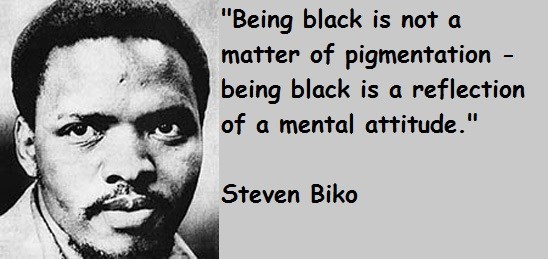 |
| (http://en.nkfu.com/steven-biko-quotes/) |
Biko's innovative ways of pursuing justice for the "colored" people of South Africa stands out as an additional heroic quality. Biko was always searching for better ways to help his fellow countrymen to fight apartheid. For example, Biko knew that education of the people would "empower them to be self reliant by helping build clinics and organizations like the Zimele Trust Fund" (Steven). Biko was an educated person and that was one of the most powerful tools he had to help him fight against apartheid. He understood that if the uneducated were given an education than they would be more independent. Then they would be able to unite under one idea against the white-minority government. Biko realized that many of the black people's minds were battered and hollowed out so much that they took their own situation as being normal."So as a prelude whites must be made to realise that they are only human, not superior. Same with Blacks. They must be made to realise that they are also human, not inferior" (Agentofchange). Biko always continually talked about how the black man needed to get out the idea of him being inferior to whites just because of his skin pigmentation. He knew that if the people were educated they would be able to fight against apartheid more effectively. Steve was proud to be a black person and he knew that if all other blacks were brought up not feeling that way. He was famous for his slogan "black is beautiful", which he described as meaning: "man, you are okay as you are, begin to look upon yourself as a human being"(Chanda).
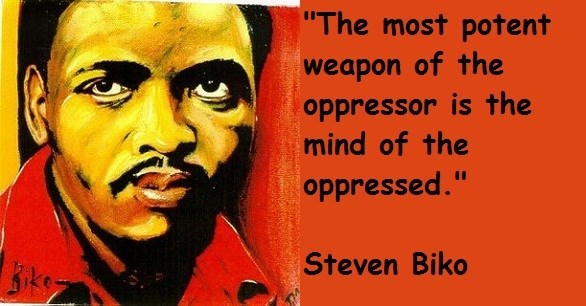 |
| (http://en.nkfu.com/steven-biko-quotes/ ) |
Steve Biko's selflessness helped black South Africans to refuse to give in to apartheid and ultimately this message changed the minds and actions of many who heard it. Although he was privileged enough to be admitted to a medical program and had a promising future career as a doctor ahead of him, Biko selflessly gave up this opportunity to instead become an activist against apartheid. "One of Biko's first activist actions was to form the South African Student's Organization (SASO) in 1969, which provided legal assistance, medical services, and social programs in black communities" (Chanda). Because he was so committed to helping black South Africans overcome the brutality of apartheid, Biko tended to their basic needs through this organization, thus helping them believe in their own worth and value. The great commitment and concern for others he showed by foregoing the wealth associated with being a doctor in exchange for a life of hard work, danger and service to others, inspired others to see him as a hero for their cause, join him, and to listen to his message. In addition to forming organizations to assist the black South African communities raise up their own standard of living, Biko spoke publicly even though he was legally prohibited from leaving his premises, or banned, and despite the danger of arrest or even physical abuse by the authorities if he was caught. "On August 17, 1977, in order to participate in talks designed to unite the many activist groups in South Africa, Biko left his banning area, King William's Town, was caught, arrested, beaten during interrogation and died shortly thereafter from the beatings" (Woods 377-379). Biko chose, selflessly, to leave his banning area knowing that his life could be in danger because the reason for the meeting was so important to bringing black South Africans together in peaceful resistance. He knew that standing up for a cause, speaking out about it, no matter the danger, was necessary for his message to be heard, and his willingness to stand behind this conviction made people take notice. The heroic sacrifices Biko made to try to end apartheid, including his career choices and his disregard for his personal safety when the cause required him to travel, inspired his followers at the time and continue to inspire people, as any hero does today who are also fighting against injustices.
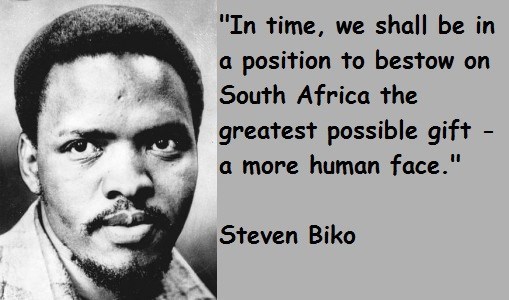 |
| (http://en.nkfu.com/steven-biko-quotes/ ()) |
Another one of Biko's heroic traits was his insightfulness into the nature of human beings and the politics of South Africa. His keen insight enabled him to inspire and motivate others to pursue a workable and peaceful end to apartheid. Growing up in South Africa and being a black South African himself, he had firsthand experience with apartheid and the imposition of white domination over black South Africans. As a result of his own experience and his insight into the needs of the black South African people, he stated "Black consciousness is in essence the realization by the black man of the need to rally together with his brothers around the cause of their operation - the blackness of their skin - and to operate as a group in order to rid themselves of the shackles that bind them to perpetual servitude" (Steve). Steve Biko understood that black South Africans needed to work together to overcome the white-imposed idea that they were an inferior race. His ideas helped black South Africans stand up for themselves, which was no easy task, against the white domination. At the same time Biko was pressing black South Africans to join forces to end apartheid, he was also aware that South Africa's future as a country depended upon the cooperation and integration of both white and black South Africans. He told the Boston Globe in an article published on October 25, 1977 ".. whites must be made to realise that they are only human, not superior. Same with Blacks. They must be made to realise that they are also human, not inferior" (About). This statement focused on the importance of both blacks and whites changing their minds about their race, their value to society, and their relationship to one another; to see themselves as humans, as equals. Because Biko could convince people that they were all important and equal, they could not justify abuse or violence toward one another, thus assuring a peaceful future, and this was the genius of this teachings. Biko's words and ideas were new and powerful and perfect for the situation in South African during apartheid: they motivated people to push for change, to demand equality and to move the country forward in a positive and peaceful direction.
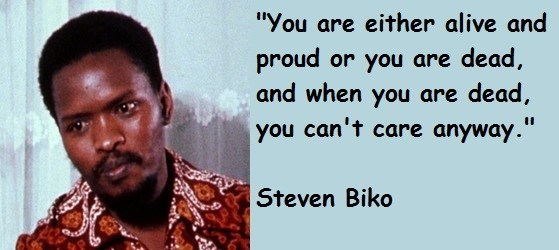 |
| (http://en.nkfu.com/steven-biko-quotes/ |
Steve Biko's noble and intuitive character is the reason he is my hero. Steve Biko was a selfless person who fought innovatively against the apartheid government of South Africa. The main reason Biko did this was so that his people could rise after being downtrodden for nearly 300 years after the first white-settlers colonized South Africa and started the brutal treatment of colored people there. Even though he is not here helping assist his country progress today, his words are in the hearts of all the people that have heard or known him.
"About Bantu Stephen Biko." Steve Biko Foundation. Rural Brands, 2012. Web. 19
May 2012. "Biko, Steve (1946-1977)." Encyclopedia of World Biography. Detroit: Gale, 1998. Gale Biography In Context. Web. 10 May 2012.
Agentofchange. "Tribute to Steve Biko." Beat Knowledge. Wordpress, 2010-2012.
Web. 21 May 2012.
"Steve Biko." African Biography. Gale, 1999. Gale Biography In Context. Web. 10 May 2012.
"Steven Biko." Contemporary Black Biography. Vol. 4. Detroit: Gale, 1993. Gale Biography In Context. Web. 10 May 2012.
Woods, Donald. Biko. New York: Paddington Press, 1978
Chanda, Kadoka. "Analysis on Steve Biko and his leadership qualities." The
African Dream. N.p., 2009. Web. 17 May 2012.
"King William's Town's hero:." Buffalo City Metro. big, n.d. Web. 15 May 2012.
Page created on 5/24/2012 12:00:00 AM
Last edited 1/5/2017 11:39:44 PM
